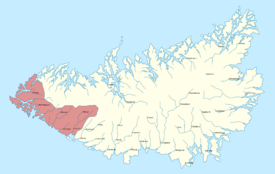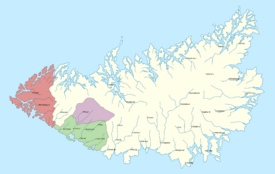Hrodmir
Kingdom of Hrodmir ᚱᛁᚴᛁᛋ ᚺᚱᛟᛞᛗᛁᚱ (Rikis Hrodmir) | |||||||||||||
|---|---|---|---|---|---|---|---|---|---|---|---|---|---|
| 931–1105 | |||||||||||||
 Hrodmir (red) during it's territorial peak (1013 CE) | |||||||||||||
 Successor states to Hrodmir Svernland (red), Vermland (green), and High Skogn (purple) | |||||||||||||
| Capital | Namdalaseid | ||||||||||||
| Religion | Ejderic paganism | ||||||||||||
| Demonym(s) | Hrodmiric | ||||||||||||
| Government | Absolute monarchy | ||||||||||||
| King | |||||||||||||
• 931-947 | Orderic Whitehand | ||||||||||||
• 947-956 | Halfborn the Wild | ||||||||||||
• | ... | ||||||||||||
• 1089-1105 | Gudrun Strongbow | ||||||||||||
| History | |||||||||||||
• Established | 931 | ||||||||||||
• Disestablished | 1105 | ||||||||||||
| |||||||||||||
| Today part of | Solstiana | ||||||||||||
This article is incomplete because it is pending further input from participants, or it is a work-in-progress by one author. Please comment on this article's talk page to share your input, comments and questions. Note: To contribute to this article, you may need to seek help from the author(s) of this page. |
The Kingdom of Hrodmir was an Ejderic state in the western region of Isle of Svøyen during the late 10th to early 12th century CE. It was formed by Orderic Whitehand, a military leader in the preceding North Sea Empire and was composed of the settlements of Angvik and Einslot (in modern Klovemark between Klovset and Jorstad). Orderic, like his precursors in the North Sea, was primarily interested in the seizure of goods from Northwest Euclea and the later sale of those goods to Verliquois, or Verlicane as they referred to it. To that end, Orderic and his successors built and maintained a string of small fortified settlements along the southern coast of Svøyen called evening houses or "kveldshus".
Hrodmir fought perennially with the Dalm, the indigenous inhabitants of Svøyen, for control of inland territories. The kingdom reached a territorial peak at modern Skogn under the king Doran Greptfjell. Hrodmir's military might sustained it longer than many other petty kingdoms of the Greindrifa, but slowed the political and economic development of the country. In 1105 when Gudrun Strongbow was defeated in successive battles by the Bjarnar and later the army of Olav of Angpern, the country was effectively destroyed. Without a large population to replenish the army or a centralized economy, the kingdom was divided into the three smaller states of Svernica, Vermland, and High Skogn.
